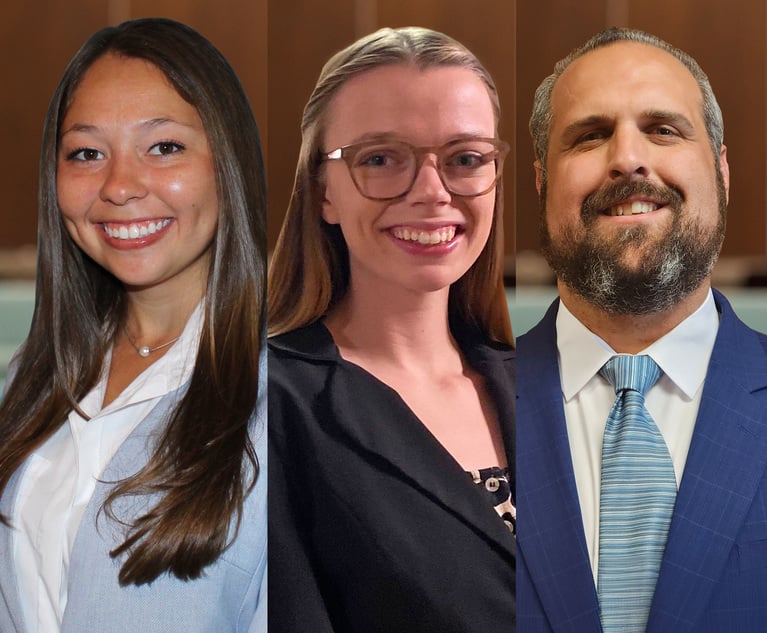Forum Selection Clause Frees Mary Kay From NJ Sales Reps' Class Suit
A wage-and-hour suit on behalf of Mary Kay sales consultants won't be heard in New Jersey after the Third Circuit ruled that Texas law governs interpretation of a forum-selection clause in the cosmetics company's employment contract.
October 20, 2017 at 03:33 PM
4 minute read

A wage-and-hour suit on behalf of Mary Kay sales consultants won't be heard in New Jersey after the U.S. Court of Appeals for the Third Circuit ruled that Texas law governs interpretation of a forum-selection clause in the cosmetics company's employment contract.
The appeals court, in a published decision, affirmed a ruling from the U.S. District Court for the District of New Jersey dismissing a potential class action against Addison, Texas-based Mary Kay after finding that Texas law dictates that the claim belongs in that state's courts.
Ina Collins, who held the positions of sales consultant and sales director for Mary Kay, brought suit on behalf of fellow New Jersey residents who worked for the company from September 2009 to the present. She claims that the company improperly categorizes sales representatives and sales managers as independent consultants, in violation of New Jersey's Wage Payment Law. Collins also contends that Mary Kay improperly requires sales representatives to pay for marketing materials, merchandise and uniforms out of their own earnings.
U.S. District Judge Madeline Arleo dismissed the suit after Mary Kay brought a forum non conveniens motion, relying on employment agreements specifying that legal claims would be submitted to a Texas court and dictating that Texas law would apply. Arleo's decision was based on federal common law. On appeal, Collins' lawyer argued that the analysis should be governed by New Jersey law.
The appeal focused on the scope of the forum-selection clause, not its enforceability, Collins' lawyer said in briefs and at oral argument.
Third Circuit Judges Michael Chagares, L. Felipe Restrepo and Jane Roth concluded that state contract law, not federal common law, governs the interpretation of the forum-selection clauses in the case. As for which state's contract law applies, they said the law of New Jersey, the forum state, applies to choice-of-law questions in a diversity case like the present one. And New Jersey choice-of-law rules dictate that when parties to a contract have agreed to be governed by the laws of a particular state, New Jersey courts will ordinarily uphold the contractual choice, the court said. But the parties' contractual choice doesn't control in cases where the chosen state has no substantial relationship to the parties or the transaction, and there is no other reasonable basis for the parties' choice; or where application of the law of the chosen state would be contrary to a fundamental policy of a state that has a materially greater interest than the chosen state in the determination of the particular issue, the court said.
Collins has not demonstrated that either of those exceptions apply, Restrepo wrote for the court. There is no dispute that the parties have a substantial relationship to Texas, and Collins has not shown why New Jersey has a materially greater interest in the application of its own contract law to the interpretation of forum-selection clauses, or how the application of Texas contract law would offend a fundamental policy of New Jersey, Restrepo wrote.
The appeals court declined to find fault with application of the forum non conveniens doctrine by the judge below. Collins did not dispute the availability of an alternate forum to hear her claim, or address with any specificity the public interest factors that could favor litigation in New Jersey federal court over Texas state court, Restrepo wrote. The district court correctly granted Mary Kay's forum non conveniens motion and dismiss the case because Collins failed to meet the heavy burden required to resist application of the forum-selection clause, the court said.
“We are mindful of the predicament that could arise for a plaintiff who (a) performs work in her home state for a company headquartered in another state, (b) seeks the substantive protections guaranteed by her home state's wage payment law, and (c) is subject to forum selection and choice-of-law clauses in her employment agreement that point outside of her home state. But it is incumbent on plaintiffs in those situations to challenge the enforceability of the forum selection clauses and to outline for the lower court exactly how they stand to be deprived of the wage payment protections they are otherwise guaranteed. Collins made no attempt to do so in this case,” the court said.
Collins' lawyer, Ravi Sattiraju of Princeton, declined to comment on the ruling other than to say that his client was weighing her options.
Christine Amalfe of Gibbons in Newark, who represented Mary Kay, declined to comment.
Mary Kay did not respond to a reporter's message left at company headquarters.
This content has been archived. It is available through our partners, LexisNexis® and Bloomberg Law.
To view this content, please continue to their sites.
Not a Lexis Subscriber?
Subscribe Now
Not a Bloomberg Law Subscriber?
Subscribe Now
NOT FOR REPRINT
© 2025 ALM Global, LLC, All Rights Reserved. Request academic re-use from www.copyright.com. All other uses, submit a request to [email protected]. For more information visit Asset & Logo Licensing.
You Might Like
View All
Tensions Run High at Final Hearing Before Manhattan Congestion Pricing Takes Effect
3 minute read
On the Move and After Hours: Trenk Isabel; Connell Foley; Faegre Drinker; ABOTA Northern NJ Chapter
3 minute read

Lack of Available Auto Safety Features Does Not Equal Products Liability Act Violation, NJ Appeals Court Says
4 minute readTrending Stories
- 1Restoring Trust in the Courts Starts in New York
- 2'Pull Back the Curtain': Ex-NFL Players Seek Discovery in Lawsuit Over League's Disability Plan
- 3Tensions Run High at Final Hearing Before Manhattan Congestion Pricing Takes Effect
- 4Improper Removal to Fed. Court Leads to $100K Bill for Blue Cross Blue Shield
- 5Michael Halpern, Beloved Key West Attorney, Dies at 72
Who Got The Work
Michael G. Bongiorno, Andrew Scott Dulberg and Elizabeth E. Driscoll from Wilmer Cutler Pickering Hale and Dorr have stepped in to represent Symbotic Inc., an A.I.-enabled technology platform that focuses on increasing supply chain efficiency, and other defendants in a pending shareholder derivative lawsuit. The case, filed Oct. 2 in Massachusetts District Court by the Brown Law Firm on behalf of Stephen Austen, accuses certain officers and directors of misleading investors in regard to Symbotic's potential for margin growth by failing to disclose that the company was not equipped to timely deploy its systems or manage expenses through project delays. The case, assigned to U.S. District Judge Nathaniel M. Gorton, is 1:24-cv-12522, Austen v. Cohen et al.
Who Got The Work
Edmund Polubinski and Marie Killmond of Davis Polk & Wardwell have entered appearances for data platform software development company MongoDB and other defendants in a pending shareholder derivative lawsuit. The action, filed Oct. 7 in New York Southern District Court by the Brown Law Firm, accuses the company's directors and/or officers of falsely expressing confidence in the company’s restructuring of its sales incentive plan and downplaying the severity of decreases in its upfront commitments. The case is 1:24-cv-07594, Roy v. Ittycheria et al.
Who Got The Work
Amy O. Bruchs and Kurt F. Ellison of Michael Best & Friedrich have entered appearances for Epic Systems Corp. in a pending employment discrimination lawsuit. The suit was filed Sept. 7 in Wisconsin Western District Court by Levine Eisberner LLC and Siri & Glimstad on behalf of a project manager who claims that he was wrongfully terminated after applying for a religious exemption to the defendant's COVID-19 vaccine mandate. The case, assigned to U.S. Magistrate Judge Anita Marie Boor, is 3:24-cv-00630, Secker, Nathan v. Epic Systems Corporation.
Who Got The Work
David X. Sullivan, Thomas J. Finn and Gregory A. Hall from McCarter & English have entered appearances for Sunrun Installation Services in a pending civil rights lawsuit. The complaint was filed Sept. 4 in Connecticut District Court by attorney Robert M. Berke on behalf of former employee George Edward Steins, who was arrested and charged with employing an unregistered home improvement salesperson. The complaint alleges that had Sunrun informed the Connecticut Department of Consumer Protection that the plaintiff's employment had ended in 2017 and that he no longer held Sunrun's home improvement contractor license, he would not have been hit with charges, which were dismissed in May 2024. The case, assigned to U.S. District Judge Jeffrey A. Meyer, is 3:24-cv-01423, Steins v. Sunrun, Inc. et al.
Who Got The Work
Greenberg Traurig shareholder Joshua L. Raskin has entered an appearance for boohoo.com UK Ltd. in a pending patent infringement lawsuit. The suit, filed Sept. 3 in Texas Eastern District Court by Rozier Hardt McDonough on behalf of Alto Dynamics, asserts five patents related to an online shopping platform. The case, assigned to U.S. District Judge Rodney Gilstrap, is 2:24-cv-00719, Alto Dynamics, LLC v. boohoo.com UK Limited.
Featured Firms
Law Offices of Gary Martin Hays & Associates, P.C.
(470) 294-1674
Law Offices of Mark E. Salomone
(857) 444-6468
Smith & Hassler
(713) 739-1250






